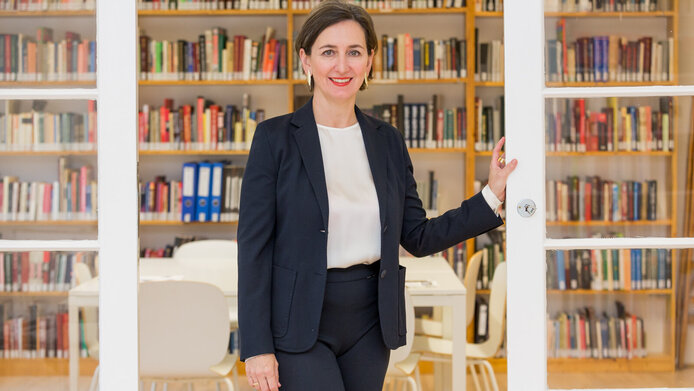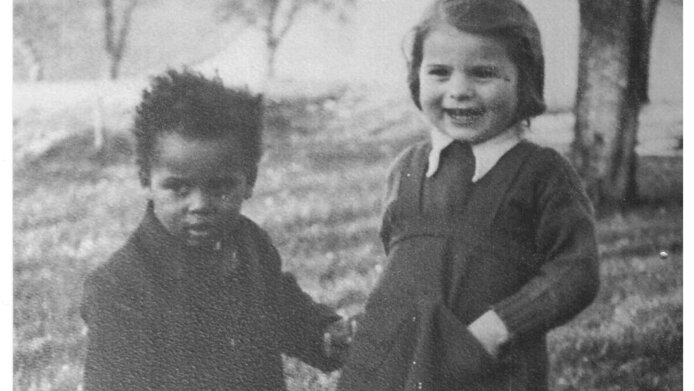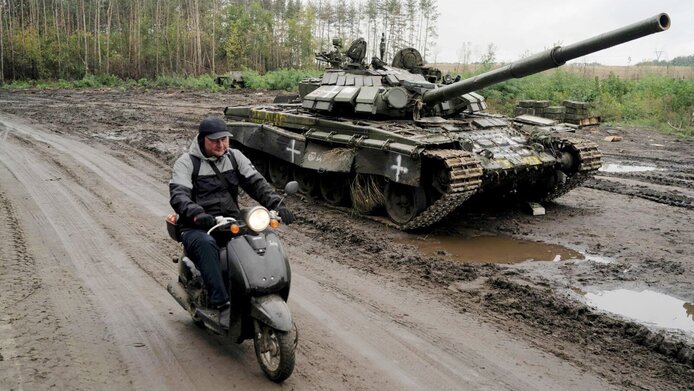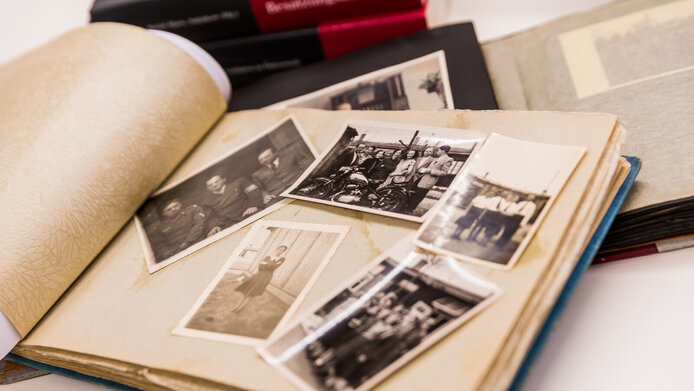The power of stories untold

On October 7, 2022, the Nobel Committee announced this year's Nobel Peace Prize laureates, the Belarusian human rights lawyer Ales Bjalyazki, the Center for Civil Liberties in Ukraine, and the Russian human rights organization Memorial. Just hours after the announcement, a Russian court ordered the seizure of Memorial's Moscow offices. Less than a year earlier, in December 2021, the Russian Supreme Court had already ordered the shut-down of this human rights organization, which was formed in 1987 during the era of glasnost and perestroika and initially focused on documenting crimes committed in the Stalin era. In recent years, the group has spoken out against the repression of dissidents under President Vladimir Putin and kept a list of political prisoners in Russia.
From a spirit of optimism back to the Cold War
Barbara Stelzl-Marx is intimately familiar with Memorial Moscow. Now the director of the Ludwig Boltzmann Institute for Research on the Consequences of War in Graz and professor of contemporary history at the University of Graz, she herself worked in this human rights organization in 1999 on an Erwin Schrödinger Fellowship funded by the Austrian Science Fund FWF. She paid her first visit to Moscow in 1991. “At the beginning of the 1990s, the archives were opened up, it had become possible to travel, to do research, to conduct interviews,” she says, recalling the spirit of optimism that reigned at the time.
In recent years she has observed a reverse movement, however: a spreading sense of fear. Colleagues are increasingly worried that voicing opinions – such as negative statements about the behavior of the Red Army at the end of the war – could be considered to be critical of Russia and thus have a negative impact on their careers. Stelzl-Marx also observed an increase in intelligence activities.
“You had to be really careful about what you discussed with whom. Sensitive topics were sometimes only discussed in the street and not indoors. That was tantamount to a return to the Cold War period. Now we're back in the thick of it.” Now living in Graz, Stelzl-Marx has regularly visited Russia since 1991 and established close contacts with archives and research institutions there. That changed abruptly with the war in Ukraine. Conferences have been canceled, and contacts with colleagues are currently maintained mainly at an individual and informal level.
Vienna – a Cold War hub
With the war, a project currently funded by the FWF has gained unexpected topicality. Stelzl-Marx is investigating the role of Czechoslovak intelligence services in Austria after World War II. “Because of its geopolitical location, Vienna was a hub of espionage during the allied occupation, but also afterwards.” Czechoslovak intelligence services were among the most active in Eastern Europe in this regard. “Austria played a crucial role in the burgeoning Cold War,” notes Stelzl-Marx. One member of her team, the doctoral student Dieter Bacher, is coordinating this project, which will involve, for example, systematically analyzing the activities of the British and U.S. intelligence services against the Czechoslovak services in Austria. Who was recruited for this service and why, and how did they act and interact? In the context of the FWF project, the team has succeeded in bringing the international conference “Need to know” to Graz in October 2023. There the results of the project will be presented and discussed.
New generation of children of war
The war in Ukraine affects Stelzl-Marx deeply: “So many topics that we investigate in contemporary history from a backward-looking perspective – the Cold War, children of war, flight and displacement, economic and humanitarian consequences of war – are currently happening on our doorstep.” “Children born of war” is one of Stelzl-Marx's core research topics. A new generation of children of war is emerging in Ukraine and Russia, who are experiencing war – in bomb shelters, as refugees – and whose fathers or brothers are killed in the war. The historian is convinced that “the after-effects will be felt for many decades.”
The power of history
Stelzl-Marx knows what she is talking about. For decades, she has been dealing with the consequences of World War II and the Cold War, whose impact can still be felt today. “Looking at the past helps us understand the present and shape the future,” she says, emphasizing the sociopolitical relevance of her subject. She also notes that history sometimes explains the behavioral patterns of a society, of individual people or political leaders. Often, taboo subjects and unresolved traumas inform events – macrohistory has an impact on microhistory.
Breaking the silence about the Präbichl massacre
In October of this year, Stelzl-Marx commemorated one of these events, one which had hardly been talked about for a long time. On the occasion of the 75th anniversary of the Liebenau Trial, Stelzl-Marx and the Institute of Contemporary History at the University of Vienna organized a scientific conference at the University of Graz. Since the late 1990s, she has been doing research on the Graz-Liebenau camp, a waystation on the so-called death marches in 1945. Tens of thousands of Hungarian Jews were made to march to the Mauthausen concentration camp shortly before the end of the war with the advancing Red Army behind them. Many did not survive these death marches and died of exhaustion, hunger, or because they were shot by the wayside.
The power of untold stories
Mass shootings took place in Rechnitz, at the Präbichl mountain pass near Eisenerz, and also in the Liebenau camp. These crimes were punished in the post-war period by Allied courts and Austrian courts, in some cases with death sentences. At a round table, descendants of perpetrators sentenced to death for these crimes spoke for the first time about what it meant for their family memory and for their own biography. “On the one hand, there was silence; on the other hand, people talked about the war but certain aspects were omitted,” notes Stelzl-Marx.
The Israeli social psychologist Dan Bar-On, who works with descendants of Holocaust victims and German perpetrators to develop models of understanding and reconciliation, describes the great power of silence, which means that “untold stories are passed on from generation to generation and have greater power than stories that can be told”.
“Occupation children” – from taboo to networking
Stelzl-Marx, who was named “Scientist of the Year 2019” by the Club of Education and Science Journalists in early 2020 for her outreach work, considers it a great privilege to conduct research in an area that can change people's lives. When investigating the lives of children of the Allied occupation, the historian felt just how impactful historical research can be. This group consists of the sons and daughters of local women and Allied soldiers, who were born in Austria and Germany between 1945 and 1956 – as a result of love relationships, brief affairs, “survival prostitution,” but also rape.
They were considered “enemy offspring” and the circumstances of their birth often exposed them to discrimination and stigmatization. Stelzl-Marx remembers the first international conference on this issue in 2012 at the Diplomatic Academy in Vienna, when those affected realized that there were others who had the same biography. “A woman came up to me and told me it was the first time she had met other occupation children and that previously she had always thought that she was the only child of an Allied soldier in Austria.” By thus removing the taboo, the conference resulted in the establishment of networks of people with similar backgrounds who can now share experiences or, for example, help each other in trying to find their fathers.

Significant encounter
Stelzl-Marx’s route to research is marked by numerous research stays and a momentous coincidence. She was born in Graz in 1971 and had an interest in languages. Accordingly, she studied English, Russian and history in Graz, and subsequently in Volgograd, Moscow, Oxford and Stanford. During a one-semester stay in Russia in 1992 as a student, she happened to meet, at Volgograd airport, the Graz historian Stefan Karner, who had been granted access to former Soviet archives shortly before that. “He told me to drop by and see him at the university when I got back,” Stelzl-Mark remembers. In 1993, Karner founded the Boltzmann Institute for Research on the Consequences of War in Graz, and Stelzl-Marx was a part of it right from the beginning, first as a research assistant, later as a postdoc. In 2002, she was appointed Karner's deputy, and after his retirement she took over the top position in 2018. In early 2019, she was appointed to a chair in Contemporary European History at the University of Graz with a focus on conflict and migration research.
Hiatus: disintegration of the Soviet Union
A hiatus in world-politics that strongly marked her historical interest was the collapse of the Soviet Union. When the coup against Mikhail Gorbachev occurred in August 1991, the young student was there to witness it. She recalls: “There was no information, no Internet, and Russian television showed Swan Lake, while my relatives in Austria were far better informed via Austrian television than we who were on the ground.” She went out into the streets and just knew that history was being written in that moment.
Root of the Ukraine war
The scholar sees this historical event as a caesura that – just like the Second World War – continues to have an impact today, and she considers it to be one of the root causes for the Ukraine war. Gorbachev's resignation at the end of 1991 marked the end of the world's largest socialist state and thus the end of the Cold War. While this development was viewed mainly positively in the West, it was different in Russia itself, where the population took a thoroughly ambivalent view of the disintegration of the Soviet Union.
Stelzl-Marx recalls the great interest that many people – especially the young – showed in the West: “When I was studying in Volgograd in 1992, complete strangers approached me and asked for an invitation for a visa.” The young had seen the new opportunities, but for the older generation a world had collapsed. As the historian explains: “Over decades they had made great sacrifices to build up and support this system, and suddenly none of it was worth anything anymore.”
Putin’s trauma
Many things that people in the Soviet Union had been proud of no longer played a role – neither Communism nor the space race. “Stalin's victory over Nazi Germany remained as the one identity-generating element that people could take pride in,” notes Stelzl-Marx. Vladimir Putin also refers to this in his current war propaganda. “The disintegration of the Soviet Union was a trauma for Putin, who uses the notion of a new ‘gathering of Russian lands’ to overcome it and strengthen the nation's self-confidence,” she explains, adding that a strong link to the war in Ukraine resides in this circumstance.

Reference to victory over Nazi Germany
One symbol that appears again and again in this context is the letter “Z”, not a Cyrillic letter actually, but a Latin one. According to one interpretation it stands for Za Pobedu (“For Victory”) and constitutes a reference to the victory over Hitler's Germany on May 9, 1945. “This is the message of the Z: our cause is as just as the fight against the Nazis in 1945,” explains Stelzl-Marx. And it also conveys something like a promise of victory.
The signs of the times
When Russia invaded Ukraine on February 24, 2022, the West was in shock. Were there no signs? “The signs of the times were there, but they were not read, or not read enough,” says Stelzl-Marx in her retrospective analysis. Under Putin's presidency, Russia had already waged several wars: in Chechnya from 1999 to 2009, in Georgia in 2008, in Syria in 2015, in Crimea and eastern Ukraine in 2014.
Since the West had reacted with restraint in 2014, Russian policymakers did not seem to have expected the harsh sanctions that followed the attack on Ukraine in 2022. “If the reaction had already been harsh in 2014, the situation would probably have developed differently,” Stelzl-Marx presumes.
Partial mobilization as a turning point
Russia's isolation is increasingly affecting all areas of life and Putin's support among the population is crumbling more and more – this is what Stelzl-Marx has learned from Moscow residents with whom she is in contact. A turning point in this regard was the proclamation of the partial mobilization on September 21, 2022, when some 300,000 reservists were to be drafted into the Russian army. “For many people, particularly those who watch Russian state media, the war had been far from their own reality. And it was called a 'special operation', after all. But with the partial mobilization it has invaded every family. When your own son, husband or father is sent to war, or could be, your attitude will change,” explains Stelzl-Marx. Even before that, many critics of the war tried to leave the country. With the draft, their numbers climbed even higher. At the end of September, Finland reported a peak in Russian arrivals of 12,000 to 16,000 individuals, and subsequently tightened its entry regulations.
Hoping for a Russian withdrawal
No one knows what will happen next. The mother of a son hopes that the situation will not escalate further and that Russia will withdraw its troops: “The Russian media are largely controlled by the state. Putin might succeed in saving face and selling the withdrawal to the Russian population as a success,” she says, hoping “that all the channels of communication between East and West, from which nothing leaks out, but which existed even in the Cold War and which certainly exist now, will be used.” Whatever will happen, the war will create traumas. Again, taboo stories that no one is talking about will unleash their power for generations. A look into the past helps to understand the present – and it will require great efforts from all sides to forge a future from this basis.
Personal details
The historian Barbara Stelzl-Marx heads the Ludwig Boltzmann Institute for Research on the Consequences of War (BIK) and holds a chair for Contemporary European History with a focus on conflict and migration research at the University of Graz. She studied English, Russian and history in Graz, and her studies and research took her to Volgograd, Moscow, Oxford and Stanford. In 1999, she worked for the Russian human rights organization Memorial Moscow in the context of an Erwin Schrödinger Fellowship from the Austrian Science Fund FWF. She wrote her professorial qualification thesis under an APART grant from the Austrian Academy of Sciences on the topic of “Stalin's Soldiers in Austria. An Inside View of the Soviet Occupation 1945-1955.”
This Graz-based historian is currently working on two research projects funded by the FWF: she is investigating the role of Czechoslovak intelligence services in post-war Austria, and, in the context of the “Encampment” project, she is investigating camps that were set up for refugees and displaced persons in the Soviet occupation zone in Austria in 1945. Her main areas of interest are the consequences of the Second World War, the Cold War, children of war, migration, and remembrance and commemoration. For her outreach work, she was named “Scientist of the Year 2019” by the Club of Educational and Scientific Journalists. Her research has contributed, inter alia, to the removal of taboos and networking of children born of occupation in Austria.






